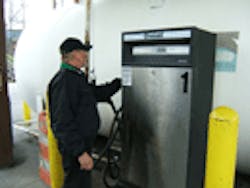With fuel prices eating into profits more and more, there are several ways to cut costs by analyzing what is working and what is not, fleet professionals said during yesterday’s webcast, “Survivors’ Guide to the Fuel Crisis,” hosted by FleetOwner and the Truckload Carriers Assn.
George L. Edwards, founder & president of George L. Edwards and Associates, said during the webcast that fleets need to continually evaluate processes, seeking to find methods to reduce fixed costs and be more efficient tomorrow than they were today.
Fleets must look at niche compatibility for each customer. “An organization cannot be everything to every customer,” Edwards said. Yet they must try to keep them satisfied. “We want to create a bond with our core customers that is so strong no competitor can come in and break that bond,” he added.
“We need to evaluate the customer base,” Edwards said. “Who are my core customers? What are their traffic lanes? How do these lanes fit into our power lines? What levels of service are required? What levels are provided?”
Edwards said that it’s important to ensure that each customer is profitable. “I realize that saying no to a customer is difficult, but if we aren’t going to make a profit, it isn’t worth it,” he said.
Using technology, quality, productivity and accountability, Edwards said, fleets can best use the funds they have to be more cost-effective—to a point. “We can only go so far with cutting costs before cutting into the resources of the company,” he said.
The second part of the webcast featured executives from Guelph, ON-based MacKinnon Transport, who discussed how they have been able to trim costs and become more fuel efficient in addition to reducing emissions.
“We’ve recently made the change across the board to a maximum of 62 miles per hour, a three MPH reduction, which has led to an estimated $150,000 in annual savings,” said Richard Sharpe, MacKinnon vp of fleet services.
The company said that through limiting speed and working to reduce idling, it has cut its idling nearly in half, from 28.2% to 14.34%, reduced stop idle time from 16% to 8.7% and increased miles per gallon from 6.6 to 7.1.
Both MacKinnon Transport and George Edwards noted the importance of technology to measure efficiency. “You have to have software to measure performance. If you can’t measure it, you can’t manage it,” said Rick Miller, vp of operations for MacKinnon.
Ray Haight, executive director of MacKinnon, added that the company was proud to have attained EPA SmartWay-certification in 2007.
